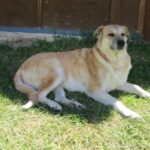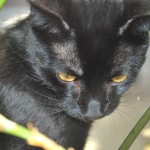Conference Notes: Natural Canine Health
 A few weeks back I attended the four-day Natural Canine Health Symposium (NCHS), hosted by Dana Scott, editor-in-chief of Dogs Naturally Magazine. There was quite an impressive list of speakers: from the top Veterinary Oncologist, Dr. Marty Goldstein, to Dr. Karen Becker, who some of you may know from Mercola’s Healthy Pet website.
A few weeks back I attended the four-day Natural Canine Health Symposium (NCHS), hosted by Dana Scott, editor-in-chief of Dogs Naturally Magazine. There was quite an impressive list of speakers: from the top Veterinary Oncologist, Dr. Marty Goldstein, to Dr. Karen Becker, who some of you may know from Mercola’s Healthy Pet website.
Other speakers included, Homeopathic Veterinarian Dr. Richard Pitcarin. He spoke of Chronic Miasms: What they are, and how they affect our pets. Unless you have studied homeopathy, you may not be familiar with the term miasm. It’s an Greek word that means “stain” or “taint.” The father of homeopathy, Dr. Samuel Hahnemann, had observed patients who had been successfully treated for a disease, only to have re-occurrences over and over again, and sometimes the disease would return worst than before. Hahnemann realized that there was a deeper underlying issue involved. He called it a miasm. Anytime a disease is not properly cured, but suppressed, and if the underlying susceptilibity is not corrected, the disease moves deeper into the organism and becomes hereditary…a taint on future generations that can take away the ability of the organism to recover on its own.
There were other homeopathic practitioners who also spoke at the Symposium: Maria Ringo, DHMHS, CCH, discussed cell salts, sometimes known as tissue salts, or Biochemic Medicine. Cell salts are electrolytes in molten form. They are a set of 12 low-potency (6x) homeopathic remedies made from minerals and each one has its own healing application in the body. Who knew salt was medicine!
Next, Dr. Dee Blanco, DVM, gave a presentation on homeopathic nosodes. What are nosodes? And, why use them? They are a natural option to vaccines. Nosodes are safer, because they remove the risks of adverse reactions. Also, they remove the injection of toxins, like, aluminum, mercury, formaldehyde, antibiotics, antifungals, growth tissue, etc. All of which, is frequently the cause of auto-immune diseases.
Holistic veterinarian Randy Kidd, DVM, PHd, suggested that to become a herbalist you need to find a prototype herb—a teacher herb, a plant that appeals to your mind/body/spirit. For Dr. Kidd, it was the mullein plant. One day, he observed deer in his backyard ravenously eating mullein, and he wanted to know why. It turns out mullein is medicinal. It’s a lung protector. And, as an oil infusion, mullein flowers are good for otitis.
Richard S. Patton, PhD, discussed matching diet to genetic makeup, and Kelly Holland Azzaro explained the use of aromatherapy in animals. Dr. Jodie Gruenstern’s talk on integrative management of kidney disease mentioned some useful information for the first signs to look out for regarding kidney disease in your dog (or cat). Such as, an excessive volume of urine (PU-polyurina), and/or excessive thirst (PD-polydipsia). There are two types of kidney failure: Acute and Chronic. Acute Renal Failure is a rapid onset, which can be brought on by poison (anti-freeze), a bacterial infection (like from Leptospirosis), an urinary tract obstruction causing a back-up (bladder stones). Acute can be life-threatening, but not permanent. However, a Chronic Renal Disease is ongoing and persistent, and may be caused from the use of NSAID drugs, Lyme disease, excessive vaccines, diet, congenital, or idiopathic (unknown) reasons.
The remaining speakers were Steve Brown on the topic of balanced fats in a raw meat diet. Barbara Royal, DVM, discussed food as medicine. And, Chris Bessent, DVM, suggested how to properly supplement for joint disease. Did you know most hip & joint chewy supplements don’t really contain much glucosamine? If you read the label (and do the math) a 70-pound dog would have to consume approximately 7 bags of chews in order to receive the required 1500 mg (needed for a 70 lb. dog) for joint support.
Dr. Karen Becker, DVM, gave a poignant talk on caring for your senior dog, and Julie Anne Lee, DCH, finished off the symposium with her advice on how to naturally treat the Parvo virus.
Attending seminars is an important way to keep up with the latest natural treatments for various health issues affecting our companion animals. And, I especially like to hear holistic veterinarians talk about their success stories regarding herbs, nutraceuticals, homeopathy, and nutrition.
It is important for the pet owner to educate themselves, to build a foundation of knowledge, so that they can understand all the options available to improve your companion animal’s health.









